Analysing Wider Professional Practice and Development in Education
VerifiedAdded on 2023/06/15
|20
|7747
|317
Report
AI Summary
This report delves into the concept of professionalism and dual professionalism within education and training, emphasizing the importance of professional values such as responsibility, honesty, cooperation, attitude, and strong work ethics. It examines the influence of social, political, and economic factors on UK education policy, particularly post-COVID-19, and analyzes the impact of current educational policies and organizational requirements on curriculum design and practice. The report also discusses the roles and accountabilities of stakeholders and external bodies, highlighting the importance of partnerships with employees. Finally, it addresses quality assurance and improvement cycles, emphasizing self-assessment and evaluation as crucial components of professional development. The report concludes by underscoring the need for continuous improvement and adaptation within the education and training sector.
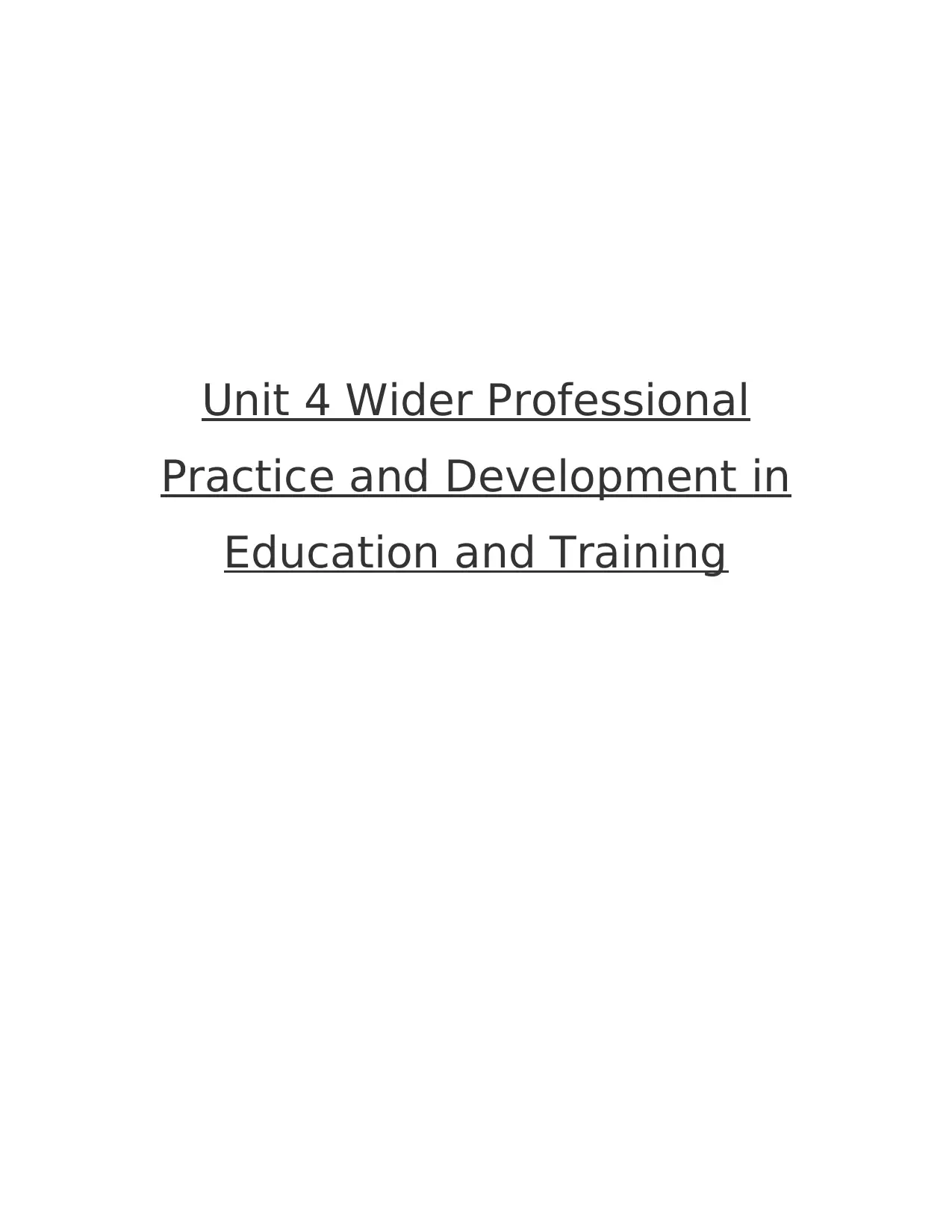
Unit 4 Wider Professional
Practice and Development in
Education and Training
Practice and Development in
Education and Training
Paraphrase This Document
Need a fresh take? Get an instant paraphrase of this document with our AI Paraphraser
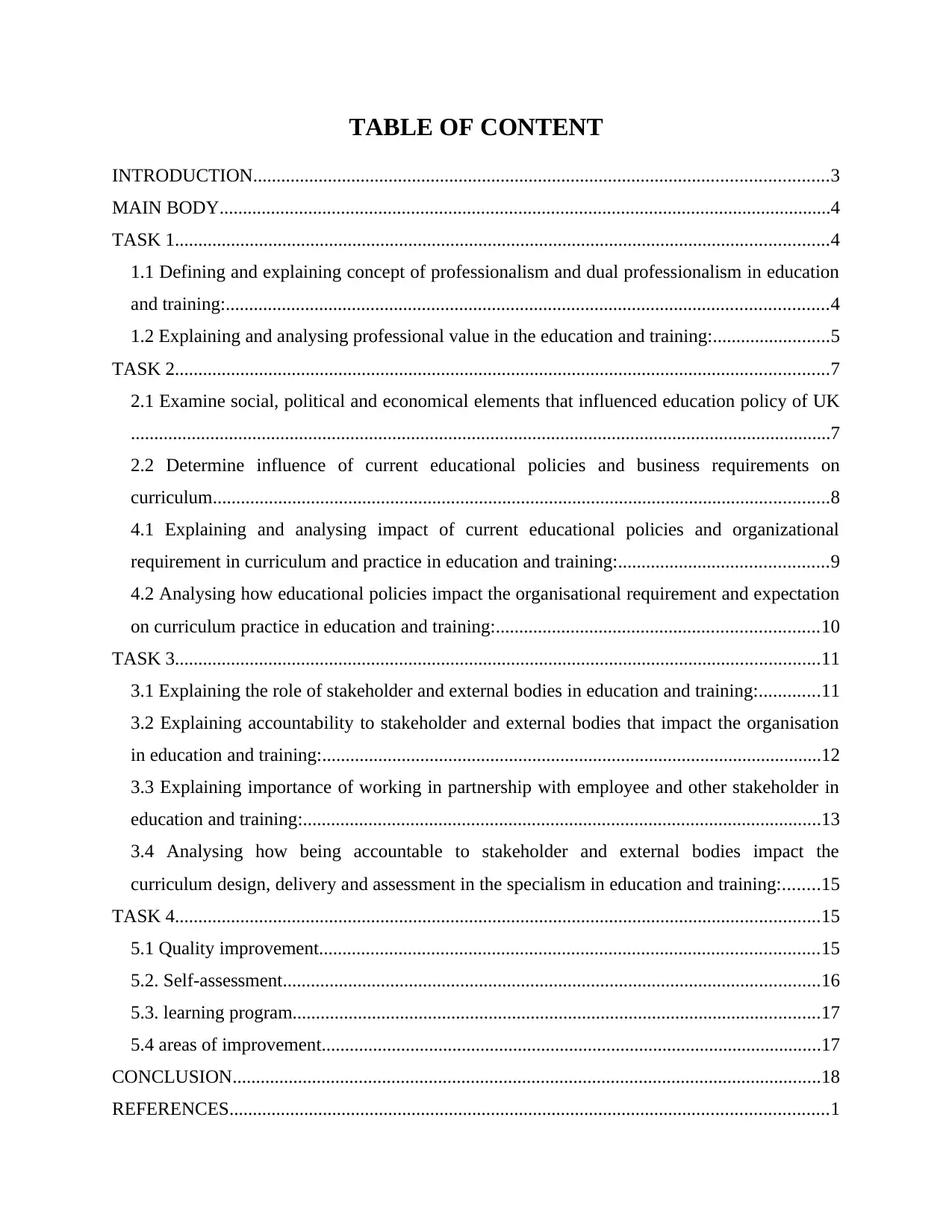
TABLE OF CONTENT
INTRODUCTION...........................................................................................................................3
MAIN BODY...................................................................................................................................4
TASK 1............................................................................................................................................4
1.1 Defining and explaining concept of professionalism and dual professionalism in education
and training:.................................................................................................................................4
1.2 Explaining and analysing professional value in the education and training:.........................5
TASK 2............................................................................................................................................7
2.1 Examine social, political and economical elements that influenced education policy of UK
......................................................................................................................................................7
2.2 Determine influence of current educational policies and business requirements on
curriculum....................................................................................................................................8
4.1 Explaining and analysing impact of current educational policies and organizational
requirement in curriculum and practice in education and training:.............................................9
4.2 Analysing how educational policies impact the organisational requirement and expectation
on curriculum practice in education and training:.....................................................................10
TASK 3..........................................................................................................................................11
3.1 Explaining the role of stakeholder and external bodies in education and training:.............11
3.2 Explaining accountability to stakeholder and external bodies that impact the organisation
in education and training:...........................................................................................................12
3.3 Explaining importance of working in partnership with employee and other stakeholder in
education and training:...............................................................................................................13
3.4 Analysing how being accountable to stakeholder and external bodies impact the
curriculum design, delivery and assessment in the specialism in education and training:........15
TASK 4..........................................................................................................................................15
5.1 Quality improvement...........................................................................................................15
5.2. Self-assessment...................................................................................................................16
5.3. learning program.................................................................................................................17
5.4 areas of improvement...........................................................................................................17
CONCLUSION..............................................................................................................................18
REFERENCES................................................................................................................................1
INTRODUCTION...........................................................................................................................3
MAIN BODY...................................................................................................................................4
TASK 1............................................................................................................................................4
1.1 Defining and explaining concept of professionalism and dual professionalism in education
and training:.................................................................................................................................4
1.2 Explaining and analysing professional value in the education and training:.........................5
TASK 2............................................................................................................................................7
2.1 Examine social, political and economical elements that influenced education policy of UK
......................................................................................................................................................7
2.2 Determine influence of current educational policies and business requirements on
curriculum....................................................................................................................................8
4.1 Explaining and analysing impact of current educational policies and organizational
requirement in curriculum and practice in education and training:.............................................9
4.2 Analysing how educational policies impact the organisational requirement and expectation
on curriculum practice in education and training:.....................................................................10
TASK 3..........................................................................................................................................11
3.1 Explaining the role of stakeholder and external bodies in education and training:.............11
3.2 Explaining accountability to stakeholder and external bodies that impact the organisation
in education and training:...........................................................................................................12
3.3 Explaining importance of working in partnership with employee and other stakeholder in
education and training:...............................................................................................................13
3.4 Analysing how being accountable to stakeholder and external bodies impact the
curriculum design, delivery and assessment in the specialism in education and training:........15
TASK 4..........................................................................................................................................15
5.1 Quality improvement...........................................................................................................15
5.2. Self-assessment...................................................................................................................16
5.3. learning program.................................................................................................................17
5.4 areas of improvement...........................................................................................................17
CONCLUSION..............................................................................................................................18
REFERENCES................................................................................................................................1
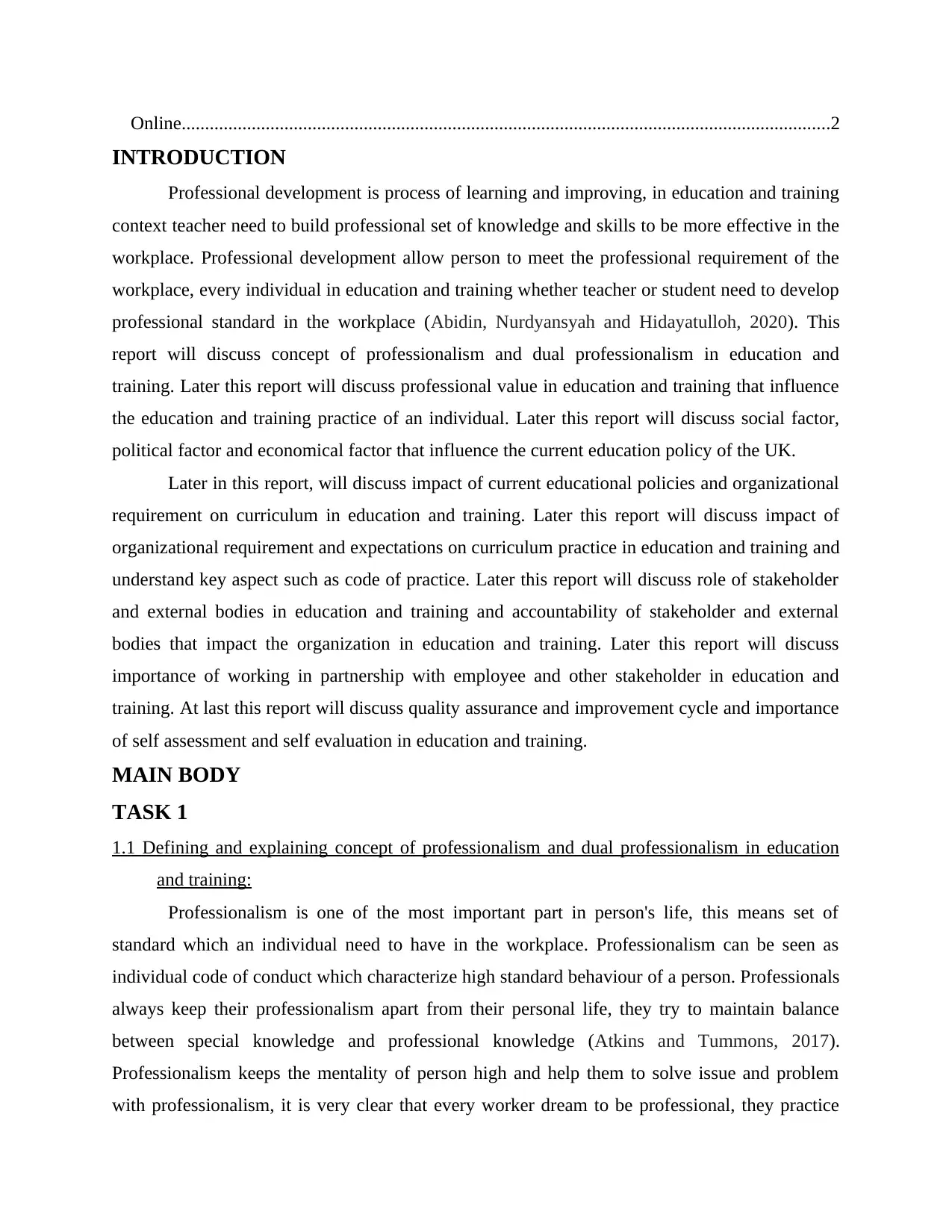
Online...........................................................................................................................................2
INTRODUCTION
Professional development is process of learning and improving, in education and training
context teacher need to build professional set of knowledge and skills to be more effective in the
workplace. Professional development allow person to meet the professional requirement of the
workplace, every individual in education and training whether teacher or student need to develop
professional standard in the workplace (Abidin, Nurdyansyah and Hidayatulloh, 2020). This
report will discuss concept of professionalism and dual professionalism in education and
training. Later this report will discuss professional value in education and training that influence
the education and training practice of an individual. Later this report will discuss social factor,
political factor and economical factor that influence the current education policy of the UK.
Later in this report, will discuss impact of current educational policies and organizational
requirement on curriculum in education and training. Later this report will discuss impact of
organizational requirement and expectations on curriculum practice in education and training and
understand key aspect such as code of practice. Later this report will discuss role of stakeholder
and external bodies in education and training and accountability of stakeholder and external
bodies that impact the organization in education and training. Later this report will discuss
importance of working in partnership with employee and other stakeholder in education and
training. At last this report will discuss quality assurance and improvement cycle and importance
of self assessment and self evaluation in education and training.
MAIN BODY
TASK 1
1.1 Defining and explaining concept of professionalism and dual professionalism in education
and training:
Professionalism is one of the most important part in person's life, this means set of
standard which an individual need to have in the workplace. Professionalism can be seen as
individual code of conduct which characterize high standard behaviour of a person. Professionals
always keep their professionalism apart from their personal life, they try to maintain balance
between special knowledge and professional knowledge (Atkins and Tummons, 2017).
Professionalism keeps the mentality of person high and help them to solve issue and problem
with professionalism, it is very clear that every worker dream to be professional, they practice
INTRODUCTION
Professional development is process of learning and improving, in education and training
context teacher need to build professional set of knowledge and skills to be more effective in the
workplace. Professional development allow person to meet the professional requirement of the
workplace, every individual in education and training whether teacher or student need to develop
professional standard in the workplace (Abidin, Nurdyansyah and Hidayatulloh, 2020). This
report will discuss concept of professionalism and dual professionalism in education and
training. Later this report will discuss professional value in education and training that influence
the education and training practice of an individual. Later this report will discuss social factor,
political factor and economical factor that influence the current education policy of the UK.
Later in this report, will discuss impact of current educational policies and organizational
requirement on curriculum in education and training. Later this report will discuss impact of
organizational requirement and expectations on curriculum practice in education and training and
understand key aspect such as code of practice. Later this report will discuss role of stakeholder
and external bodies in education and training and accountability of stakeholder and external
bodies that impact the organization in education and training. Later this report will discuss
importance of working in partnership with employee and other stakeholder in education and
training. At last this report will discuss quality assurance and improvement cycle and importance
of self assessment and self evaluation in education and training.
MAIN BODY
TASK 1
1.1 Defining and explaining concept of professionalism and dual professionalism in education
and training:
Professionalism is one of the most important part in person's life, this means set of
standard which an individual need to have in the workplace. Professionalism can be seen as
individual code of conduct which characterize high standard behaviour of a person. Professionals
always keep their professionalism apart from their personal life, they try to maintain balance
between special knowledge and professional knowledge (Atkins and Tummons, 2017).
Professionalism keeps the mentality of person high and help them to solve issue and problem
with professionalism, it is very clear that every worker dream to be professional, they practice
⊘ This is a preview!⊘
Do you want full access?
Subscribe today to unlock all pages.

Trusted by 1+ million students worldwide
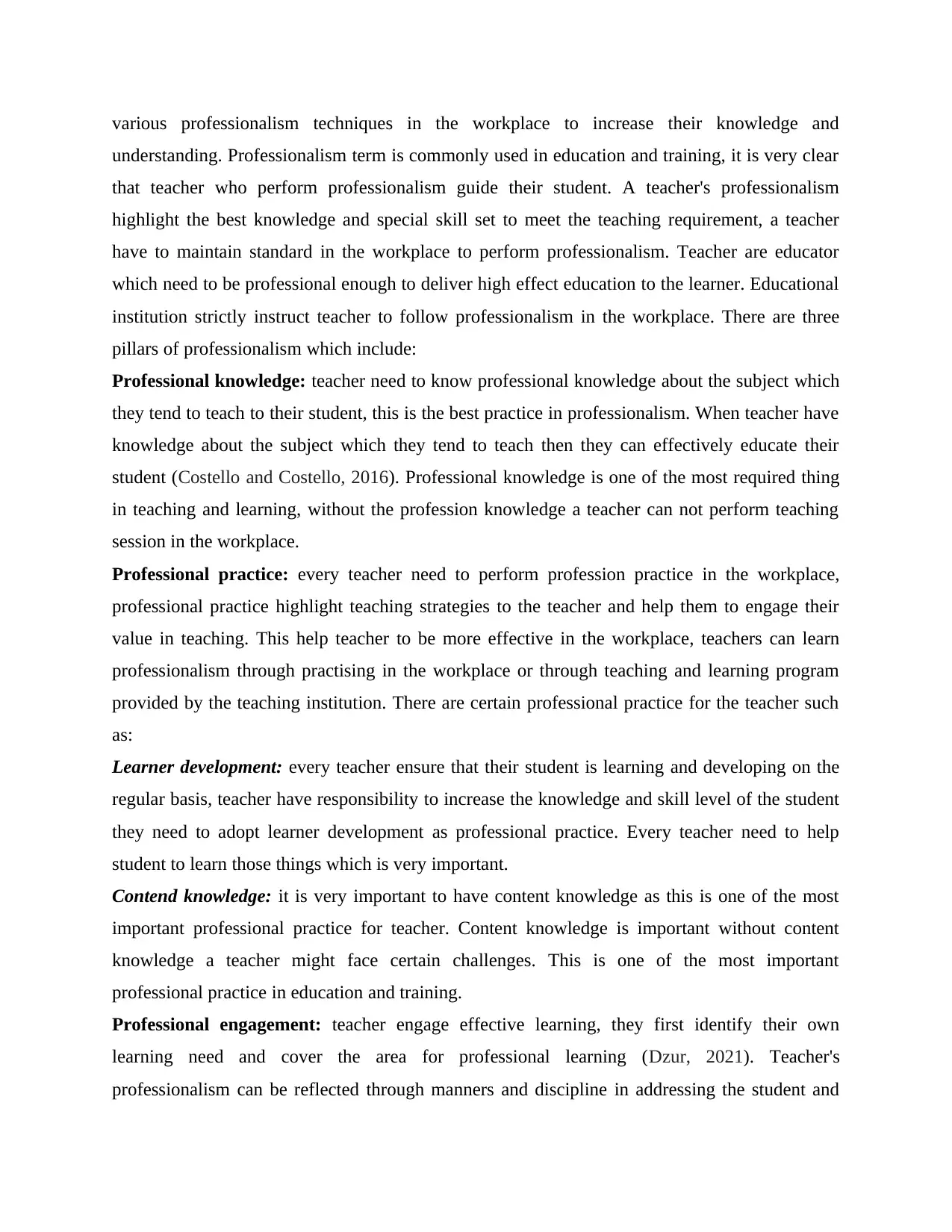
various professionalism techniques in the workplace to increase their knowledge and
understanding. Professionalism term is commonly used in education and training, it is very clear
that teacher who perform professionalism guide their student. A teacher's professionalism
highlight the best knowledge and special skill set to meet the teaching requirement, a teacher
have to maintain standard in the workplace to perform professionalism. Teacher are educator
which need to be professional enough to deliver high effect education to the learner. Educational
institution strictly instruct teacher to follow professionalism in the workplace. There are three
pillars of professionalism which include:
Professional knowledge: teacher need to know professional knowledge about the subject which
they tend to teach to their student, this is the best practice in professionalism. When teacher have
knowledge about the subject which they tend to teach then they can effectively educate their
student (Costello and Costello, 2016). Professional knowledge is one of the most required thing
in teaching and learning, without the profession knowledge a teacher can not perform teaching
session in the workplace.
Professional practice: every teacher need to perform profession practice in the workplace,
professional practice highlight teaching strategies to the teacher and help them to engage their
value in teaching. This help teacher to be more effective in the workplace, teachers can learn
professionalism through practising in the workplace or through teaching and learning program
provided by the teaching institution. There are certain professional practice for the teacher such
as:
Learner development: every teacher ensure that their student is learning and developing on the
regular basis, teacher have responsibility to increase the knowledge and skill level of the student
they need to adopt learner development as professional practice. Every teacher need to help
student to learn those things which is very important.
Contend knowledge: it is very important to have content knowledge as this is one of the most
important professional practice for teacher. Content knowledge is important without content
knowledge a teacher might face certain challenges. This is one of the most important
professional practice in education and training.
Professional engagement: teacher engage effective learning, they first identify their own
learning need and cover the area for professional learning (Dzur, 2021). Teacher's
professionalism can be reflected through manners and discipline in addressing the student and
understanding. Professionalism term is commonly used in education and training, it is very clear
that teacher who perform professionalism guide their student. A teacher's professionalism
highlight the best knowledge and special skill set to meet the teaching requirement, a teacher
have to maintain standard in the workplace to perform professionalism. Teacher are educator
which need to be professional enough to deliver high effect education to the learner. Educational
institution strictly instruct teacher to follow professionalism in the workplace. There are three
pillars of professionalism which include:
Professional knowledge: teacher need to know professional knowledge about the subject which
they tend to teach to their student, this is the best practice in professionalism. When teacher have
knowledge about the subject which they tend to teach then they can effectively educate their
student (Costello and Costello, 2016). Professional knowledge is one of the most required thing
in teaching and learning, without the profession knowledge a teacher can not perform teaching
session in the workplace.
Professional practice: every teacher need to perform profession practice in the workplace,
professional practice highlight teaching strategies to the teacher and help them to engage their
value in teaching. This help teacher to be more effective in the workplace, teachers can learn
professionalism through practising in the workplace or through teaching and learning program
provided by the teaching institution. There are certain professional practice for the teacher such
as:
Learner development: every teacher ensure that their student is learning and developing on the
regular basis, teacher have responsibility to increase the knowledge and skill level of the student
they need to adopt learner development as professional practice. Every teacher need to help
student to learn those things which is very important.
Contend knowledge: it is very important to have content knowledge as this is one of the most
important professional practice for teacher. Content knowledge is important without content
knowledge a teacher might face certain challenges. This is one of the most important
professional practice in education and training.
Professional engagement: teacher engage effective learning, they first identify their own
learning need and cover the area for professional learning (Dzur, 2021). Teacher's
professionalism can be reflected through manners and discipline in addressing the student and
Paraphrase This Document
Need a fresh take? Get an instant paraphrase of this document with our AI Paraphraser
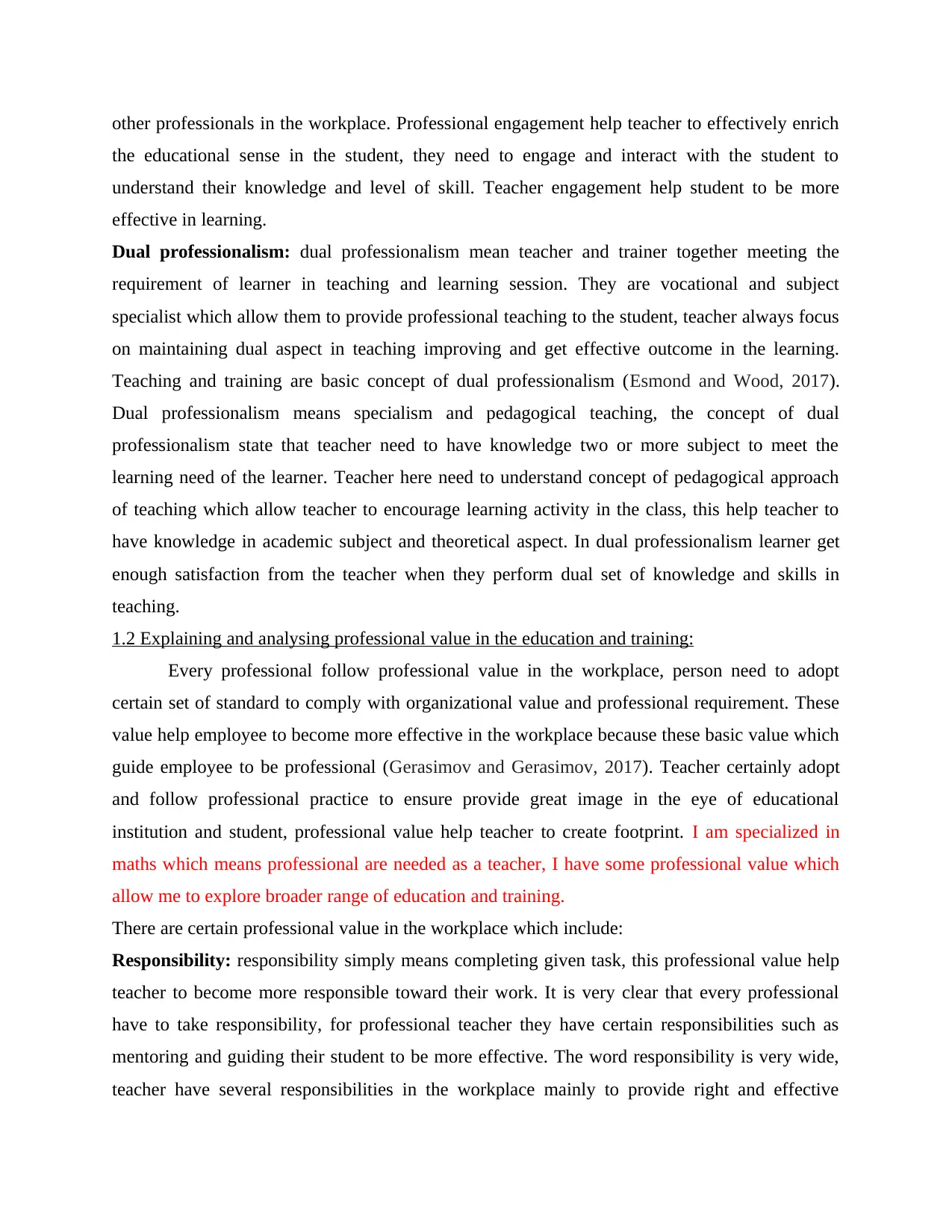
other professionals in the workplace. Professional engagement help teacher to effectively enrich
the educational sense in the student, they need to engage and interact with the student to
understand their knowledge and level of skill. Teacher engagement help student to be more
effective in learning.
Dual professionalism: dual professionalism mean teacher and trainer together meeting the
requirement of learner in teaching and learning session. They are vocational and subject
specialist which allow them to provide professional teaching to the student, teacher always focus
on maintaining dual aspect in teaching improving and get effective outcome in the learning.
Teaching and training are basic concept of dual professionalism (Esmond and Wood, 2017).
Dual professionalism means specialism and pedagogical teaching, the concept of dual
professionalism state that teacher need to have knowledge two or more subject to meet the
learning need of the learner. Teacher here need to understand concept of pedagogical approach
of teaching which allow teacher to encourage learning activity in the class, this help teacher to
have knowledge in academic subject and theoretical aspect. In dual professionalism learner get
enough satisfaction from the teacher when they perform dual set of knowledge and skills in
teaching.
1.2 Explaining and analysing professional value in the education and training:
Every professional follow professional value in the workplace, person need to adopt
certain set of standard to comply with organizational value and professional requirement. These
value help employee to become more effective in the workplace because these basic value which
guide employee to be professional (Gerasimov and Gerasimov, 2017). Teacher certainly adopt
and follow professional practice to ensure provide great image in the eye of educational
institution and student, professional value help teacher to create footprint. I am specialized in
maths which means professional are needed as a teacher, I have some professional value which
allow me to explore broader range of education and training.
There are certain professional value in the workplace which include:
Responsibility: responsibility simply means completing given task, this professional value help
teacher to become more responsible toward their work. It is very clear that every professional
have to take responsibility, for professional teacher they have certain responsibilities such as
mentoring and guiding their student to be more effective. The word responsibility is very wide,
teacher have several responsibilities in the workplace mainly to provide right and effective
the educational sense in the student, they need to engage and interact with the student to
understand their knowledge and level of skill. Teacher engagement help student to be more
effective in learning.
Dual professionalism: dual professionalism mean teacher and trainer together meeting the
requirement of learner in teaching and learning session. They are vocational and subject
specialist which allow them to provide professional teaching to the student, teacher always focus
on maintaining dual aspect in teaching improving and get effective outcome in the learning.
Teaching and training are basic concept of dual professionalism (Esmond and Wood, 2017).
Dual professionalism means specialism and pedagogical teaching, the concept of dual
professionalism state that teacher need to have knowledge two or more subject to meet the
learning need of the learner. Teacher here need to understand concept of pedagogical approach
of teaching which allow teacher to encourage learning activity in the class, this help teacher to
have knowledge in academic subject and theoretical aspect. In dual professionalism learner get
enough satisfaction from the teacher when they perform dual set of knowledge and skills in
teaching.
1.2 Explaining and analysing professional value in the education and training:
Every professional follow professional value in the workplace, person need to adopt
certain set of standard to comply with organizational value and professional requirement. These
value help employee to become more effective in the workplace because these basic value which
guide employee to be professional (Gerasimov and Gerasimov, 2017). Teacher certainly adopt
and follow professional practice to ensure provide great image in the eye of educational
institution and student, professional value help teacher to create footprint. I am specialized in
maths which means professional are needed as a teacher, I have some professional value which
allow me to explore broader range of education and training.
There are certain professional value in the workplace which include:
Responsibility: responsibility simply means completing given task, this professional value help
teacher to become more responsible toward their work. It is very clear that every professional
have to take responsibility, for professional teacher they have certain responsibilities such as
mentoring and guiding their student to be more effective. The word responsibility is very wide,
teacher have several responsibilities in the workplace mainly to provide right and effective
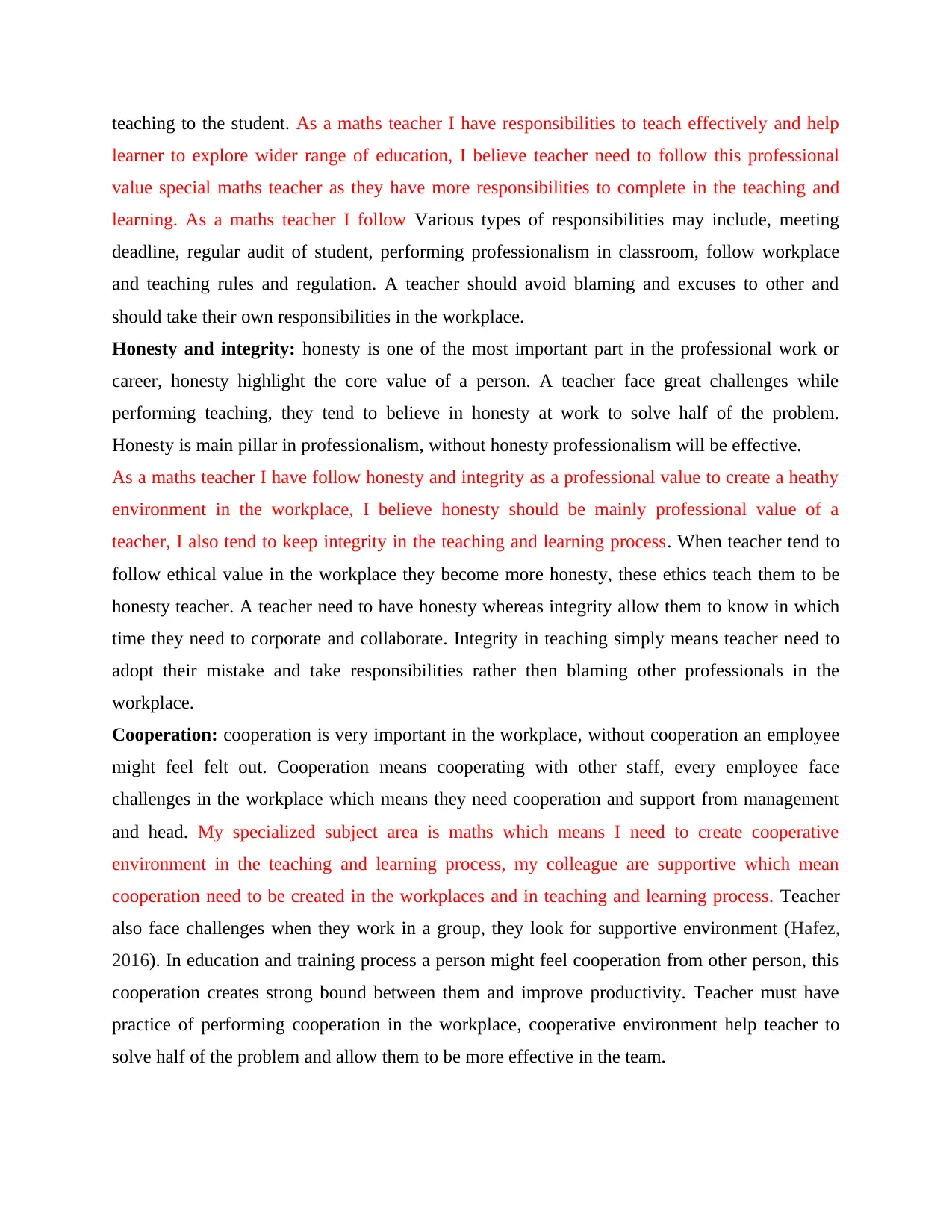
teaching to the student. As a maths teacher I have responsibilities to teach effectively and help
learner to explore wider range of education, I believe teacher need to follow this professional
value special maths teacher as they have more responsibilities to complete in the teaching and
learning. As a maths teacher I follow Various types of responsibilities may include, meeting
deadline, regular audit of student, performing professionalism in classroom, follow workplace
and teaching rules and regulation. A teacher should avoid blaming and excuses to other and
should take their own responsibilities in the workplace.
Honesty and integrity: honesty is one of the most important part in the professional work or
career, honesty highlight the core value of a person. A teacher face great challenges while
performing teaching, they tend to believe in honesty at work to solve half of the problem.
Honesty is main pillar in professionalism, without honesty professionalism will be effective.
As a maths teacher I have follow honesty and integrity as a professional value to create a heathy
environment in the workplace, I believe honesty should be mainly professional value of a
teacher, I also tend to keep integrity in the teaching and learning process. When teacher tend to
follow ethical value in the workplace they become more honesty, these ethics teach them to be
honesty teacher. A teacher need to have honesty whereas integrity allow them to know in which
time they need to corporate and collaborate. Integrity in teaching simply means teacher need to
adopt their mistake and take responsibilities rather then blaming other professionals in the
workplace.
Cooperation: cooperation is very important in the workplace, without cooperation an employee
might feel felt out. Cooperation means cooperating with other staff, every employee face
challenges in the workplace which means they need cooperation and support from management
and head. My specialized subject area is maths which means I need to create cooperative
environment in the teaching and learning process, my colleague are supportive which mean
cooperation need to be created in the workplaces and in teaching and learning process. Teacher
also face challenges when they work in a group, they look for supportive environment (Hafez,
2016). In education and training process a person might feel cooperation from other person, this
cooperation creates strong bound between them and improve productivity. Teacher must have
practice of performing cooperation in the workplace, cooperative environment help teacher to
solve half of the problem and allow them to be more effective in the team.
learner to explore wider range of education, I believe teacher need to follow this professional
value special maths teacher as they have more responsibilities to complete in the teaching and
learning. As a maths teacher I follow Various types of responsibilities may include, meeting
deadline, regular audit of student, performing professionalism in classroom, follow workplace
and teaching rules and regulation. A teacher should avoid blaming and excuses to other and
should take their own responsibilities in the workplace.
Honesty and integrity: honesty is one of the most important part in the professional work or
career, honesty highlight the core value of a person. A teacher face great challenges while
performing teaching, they tend to believe in honesty at work to solve half of the problem.
Honesty is main pillar in professionalism, without honesty professionalism will be effective.
As a maths teacher I have follow honesty and integrity as a professional value to create a heathy
environment in the workplace, I believe honesty should be mainly professional value of a
teacher, I also tend to keep integrity in the teaching and learning process. When teacher tend to
follow ethical value in the workplace they become more honesty, these ethics teach them to be
honesty teacher. A teacher need to have honesty whereas integrity allow them to know in which
time they need to corporate and collaborate. Integrity in teaching simply means teacher need to
adopt their mistake and take responsibilities rather then blaming other professionals in the
workplace.
Cooperation: cooperation is very important in the workplace, without cooperation an employee
might feel felt out. Cooperation means cooperating with other staff, every employee face
challenges in the workplace which means they need cooperation and support from management
and head. My specialized subject area is maths which means I need to create cooperative
environment in the teaching and learning process, my colleague are supportive which mean
cooperation need to be created in the workplaces and in teaching and learning process. Teacher
also face challenges when they work in a group, they look for supportive environment (Hafez,
2016). In education and training process a person might feel cooperation from other person, this
cooperation creates strong bound between them and improve productivity. Teacher must have
practice of performing cooperation in the workplace, cooperative environment help teacher to
solve half of the problem and allow them to be more effective in the team.
⊘ This is a preview!⊘
Do you want full access?
Subscribe today to unlock all pages.

Trusted by 1+ million students worldwide
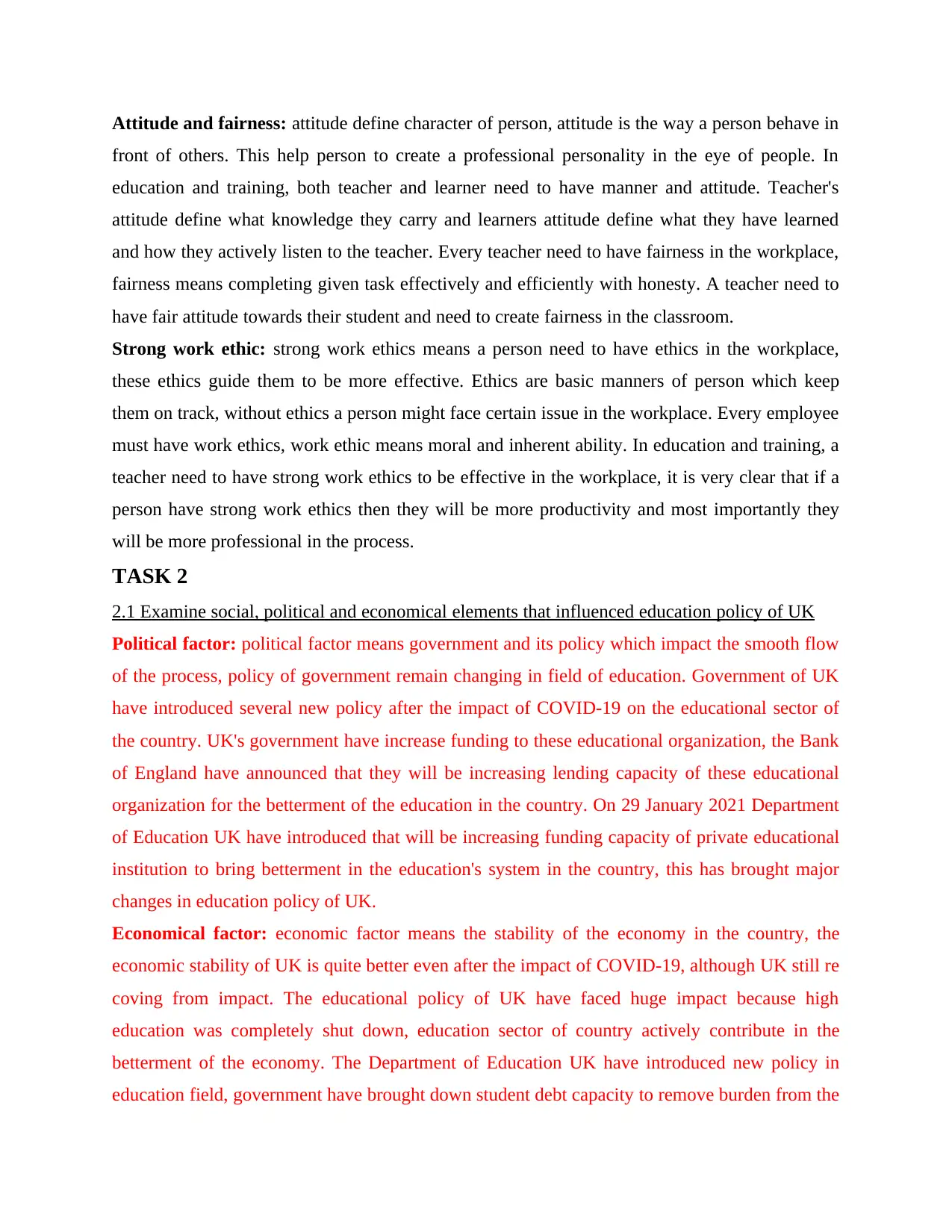
Attitude and fairness: attitude define character of person, attitude is the way a person behave in
front of others. This help person to create a professional personality in the eye of people. In
education and training, both teacher and learner need to have manner and attitude. Teacher's
attitude define what knowledge they carry and learners attitude define what they have learned
and how they actively listen to the teacher. Every teacher need to have fairness in the workplace,
fairness means completing given task effectively and efficiently with honesty. A teacher need to
have fair attitude towards their student and need to create fairness in the classroom.
Strong work ethic: strong work ethics means a person need to have ethics in the workplace,
these ethics guide them to be more effective. Ethics are basic manners of person which keep
them on track, without ethics a person might face certain issue in the workplace. Every employee
must have work ethics, work ethic means moral and inherent ability. In education and training, a
teacher need to have strong work ethics to be effective in the workplace, it is very clear that if a
person have strong work ethics then they will be more productivity and most importantly they
will be more professional in the process.
TASK 2
2.1 Examine social, political and economical elements that influenced education policy of UK
Political factor: political factor means government and its policy which impact the smooth flow
of the process, policy of government remain changing in field of education. Government of UK
have introduced several new policy after the impact of COVID-19 on the educational sector of
the country. UK's government have increase funding to these educational organization, the Bank
of England have announced that they will be increasing lending capacity of these educational
organization for the betterment of the education in the country. On 29 January 2021 Department
of Education UK have introduced that will be increasing funding capacity of private educational
institution to bring betterment in the education's system in the country, this has brought major
changes in education policy of UK.
Economical factor: economic factor means the stability of the economy in the country, the
economic stability of UK is quite better even after the impact of COVID-19, although UK still re
coving from impact. The educational policy of UK have faced huge impact because high
education was completely shut down, education sector of country actively contribute in the
betterment of the economy. The Department of Education UK have introduced new policy in
education field, government have brought down student debt capacity to remove burden from the
front of others. This help person to create a professional personality in the eye of people. In
education and training, both teacher and learner need to have manner and attitude. Teacher's
attitude define what knowledge they carry and learners attitude define what they have learned
and how they actively listen to the teacher. Every teacher need to have fairness in the workplace,
fairness means completing given task effectively and efficiently with honesty. A teacher need to
have fair attitude towards their student and need to create fairness in the classroom.
Strong work ethic: strong work ethics means a person need to have ethics in the workplace,
these ethics guide them to be more effective. Ethics are basic manners of person which keep
them on track, without ethics a person might face certain issue in the workplace. Every employee
must have work ethics, work ethic means moral and inherent ability. In education and training, a
teacher need to have strong work ethics to be effective in the workplace, it is very clear that if a
person have strong work ethics then they will be more productivity and most importantly they
will be more professional in the process.
TASK 2
2.1 Examine social, political and economical elements that influenced education policy of UK
Political factor: political factor means government and its policy which impact the smooth flow
of the process, policy of government remain changing in field of education. Government of UK
have introduced several new policy after the impact of COVID-19 on the educational sector of
the country. UK's government have increase funding to these educational organization, the Bank
of England have announced that they will be increasing lending capacity of these educational
organization for the betterment of the education in the country. On 29 January 2021 Department
of Education UK have introduced that will be increasing funding capacity of private educational
institution to bring betterment in the education's system in the country, this has brought major
changes in education policy of UK.
Economical factor: economic factor means the stability of the economy in the country, the
economic stability of UK is quite better even after the impact of COVID-19, although UK still re
coving from impact. The educational policy of UK have faced huge impact because high
education was completely shut down, education sector of country actively contribute in the
betterment of the economy. The Department of Education UK have introduced new policy in
education field, government have brought down student debt capacity to remove burden from the
Paraphrase This Document
Need a fresh take? Get an instant paraphrase of this document with our AI Paraphraser
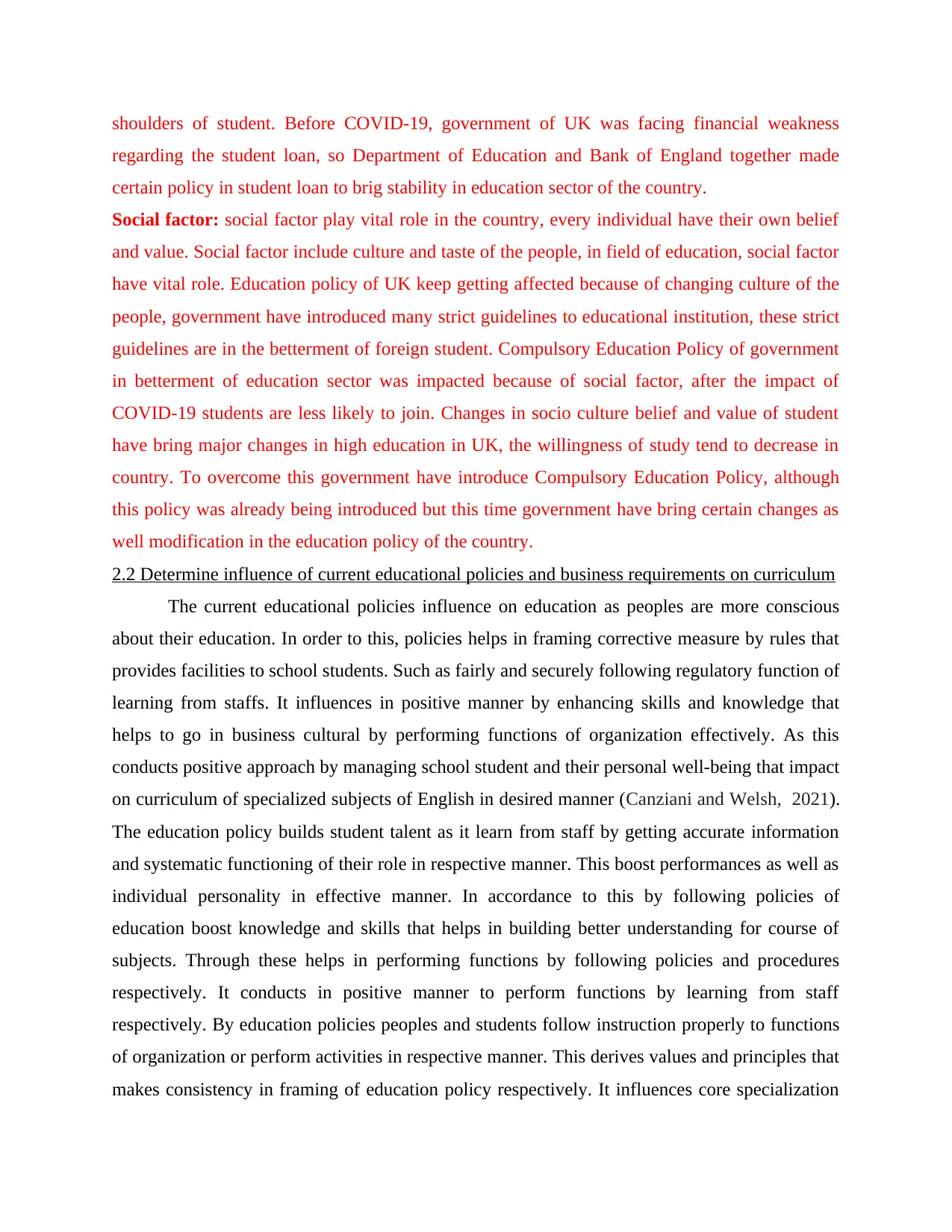
shoulders of student. Before COVID-19, government of UK was facing financial weakness
regarding the student loan, so Department of Education and Bank of England together made
certain policy in student loan to brig stability in education sector of the country.
Social factor: social factor play vital role in the country, every individual have their own belief
and value. Social factor include culture and taste of the people, in field of education, social factor
have vital role. Education policy of UK keep getting affected because of changing culture of the
people, government have introduced many strict guidelines to educational institution, these strict
guidelines are in the betterment of foreign student. Compulsory Education Policy of government
in betterment of education sector was impacted because of social factor, after the impact of
COVID-19 students are less likely to join. Changes in socio culture belief and value of student
have bring major changes in high education in UK, the willingness of study tend to decrease in
country. To overcome this government have introduce Compulsory Education Policy, although
this policy was already being introduced but this time government have bring certain changes as
well modification in the education policy of the country.
2.2 Determine influence of current educational policies and business requirements on curriculum
The current educational policies influence on education as peoples are more conscious
about their education. In order to this, policies helps in framing corrective measure by rules that
provides facilities to school students. Such as fairly and securely following regulatory function of
learning from staffs. It influences in positive manner by enhancing skills and knowledge that
helps to go in business cultural by performing functions of organization effectively. As this
conducts positive approach by managing school student and their personal well-being that impact
on curriculum of specialized subjects of English in desired manner (Canziani and Welsh, 2021).
The education policy builds student talent as it learn from staff by getting accurate information
and systematic functioning of their role in respective manner. This boost performances as well as
individual personality in effective manner. In accordance to this by following policies of
education boost knowledge and skills that helps in building better understanding for course of
subjects. Through these helps in performing functions by following policies and procedures
respectively. It conducts in positive manner to perform functions by learning from staff
respectively. By education policies peoples and students follow instruction properly to functions
of organization or perform activities in respective manner. This derives values and principles that
makes consistency in framing of education policy respectively. It influences core specialization
regarding the student loan, so Department of Education and Bank of England together made
certain policy in student loan to brig stability in education sector of the country.
Social factor: social factor play vital role in the country, every individual have their own belief
and value. Social factor include culture and taste of the people, in field of education, social factor
have vital role. Education policy of UK keep getting affected because of changing culture of the
people, government have introduced many strict guidelines to educational institution, these strict
guidelines are in the betterment of foreign student. Compulsory Education Policy of government
in betterment of education sector was impacted because of social factor, after the impact of
COVID-19 students are less likely to join. Changes in socio culture belief and value of student
have bring major changes in high education in UK, the willingness of study tend to decrease in
country. To overcome this government have introduce Compulsory Education Policy, although
this policy was already being introduced but this time government have bring certain changes as
well modification in the education policy of the country.
2.2 Determine influence of current educational policies and business requirements on curriculum
The current educational policies influence on education as peoples are more conscious
about their education. In order to this, policies helps in framing corrective measure by rules that
provides facilities to school students. Such as fairly and securely following regulatory function of
learning from staffs. It influences in positive manner by enhancing skills and knowledge that
helps to go in business cultural by performing functions of organization effectively. As this
conducts positive approach by managing school student and their personal well-being that impact
on curriculum of specialized subjects of English in desired manner (Canziani and Welsh, 2021).
The education policy builds student talent as it learn from staff by getting accurate information
and systematic functioning of their role in respective manner. This boost performances as well as
individual personality in effective manner. In accordance to this by following policies of
education boost knowledge and skills that helps in building better understanding for course of
subjects. Through these helps in performing functions by following policies and procedures
respectively. It conducts in positive manner to perform functions by learning from staff
respectively. By education policies peoples and students follow instruction properly to functions
of organization or perform activities in respective manner. This derives values and principles that
makes consistency in framing of education policy respectively. It influences core specialization
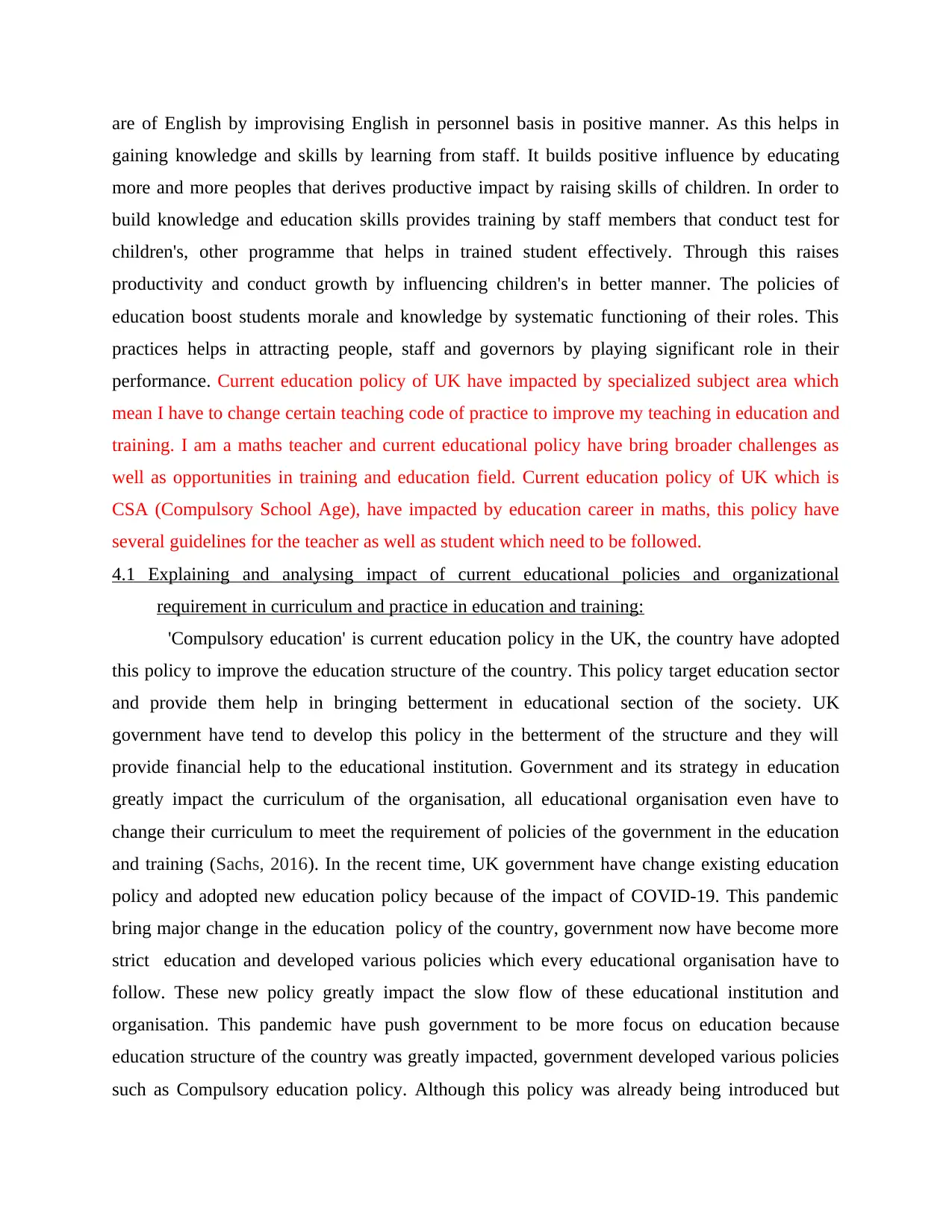
are of English by improvising English in personnel basis in positive manner. As this helps in
gaining knowledge and skills by learning from staff. It builds positive influence by educating
more and more peoples that derives productive impact by raising skills of children. In order to
build knowledge and education skills provides training by staff members that conduct test for
children's, other programme that helps in trained student effectively. Through this raises
productivity and conduct growth by influencing children's in better manner. The policies of
education boost students morale and knowledge by systematic functioning of their roles. This
practices helps in attracting people, staff and governors by playing significant role in their
performance. Current education policy of UK have impacted by specialized subject area which
mean I have to change certain teaching code of practice to improve my teaching in education and
training. I am a maths teacher and current educational policy have bring broader challenges as
well as opportunities in training and education field. Current education policy of UK which is
CSA (Compulsory School Age), have impacted by education career in maths, this policy have
several guidelines for the teacher as well as student which need to be followed.
4.1 Explaining and analysing impact of current educational policies and organizational
requirement in curriculum and practice in education and training:
'Compulsory education' is current education policy in the UK, the country have adopted
this policy to improve the education structure of the country. This policy target education sector
and provide them help in bringing betterment in educational section of the society. UK
government have tend to develop this policy in the betterment of the structure and they will
provide financial help to the educational institution. Government and its strategy in education
greatly impact the curriculum of the organisation, all educational organisation even have to
change their curriculum to meet the requirement of policies of the government in the education
and training (Sachs, 2016). In the recent time, UK government have change existing education
policy and adopted new education policy because of the impact of COVID-19. This pandemic
bring major change in the education policy of the country, government now have become more
strict education and developed various policies which every educational organisation have to
follow. These new policy greatly impact the slow flow of these educational institution and
organisation. This pandemic have push government to be more focus on education because
education structure of the country was greatly impacted, government developed various policies
such as Compulsory education policy. Although this policy was already being introduced but
gaining knowledge and skills by learning from staff. It builds positive influence by educating
more and more peoples that derives productive impact by raising skills of children. In order to
build knowledge and education skills provides training by staff members that conduct test for
children's, other programme that helps in trained student effectively. Through this raises
productivity and conduct growth by influencing children's in better manner. The policies of
education boost students morale and knowledge by systematic functioning of their roles. This
practices helps in attracting people, staff and governors by playing significant role in their
performance. Current education policy of UK have impacted by specialized subject area which
mean I have to change certain teaching code of practice to improve my teaching in education and
training. I am a maths teacher and current educational policy have bring broader challenges as
well as opportunities in training and education field. Current education policy of UK which is
CSA (Compulsory School Age), have impacted by education career in maths, this policy have
several guidelines for the teacher as well as student which need to be followed.
4.1 Explaining and analysing impact of current educational policies and organizational
requirement in curriculum and practice in education and training:
'Compulsory education' is current education policy in the UK, the country have adopted
this policy to improve the education structure of the country. This policy target education sector
and provide them help in bringing betterment in educational section of the society. UK
government have tend to develop this policy in the betterment of the structure and they will
provide financial help to the educational institution. Government and its strategy in education
greatly impact the curriculum of the organisation, all educational organisation even have to
change their curriculum to meet the requirement of policies of the government in the education
and training (Sachs, 2016). In the recent time, UK government have change existing education
policy and adopted new education policy because of the impact of COVID-19. This pandemic
bring major change in the education policy of the country, government now have become more
strict education and developed various policies which every educational organisation have to
follow. These new policy greatly impact the slow flow of these educational institution and
organisation. This pandemic have push government to be more focus on education because
education structure of the country was greatly impacted, government developed various policies
such as Compulsory education policy. Although this policy was already being introduced but
⊘ This is a preview!⊘
Do you want full access?
Subscribe today to unlock all pages.

Trusted by 1+ million students worldwide
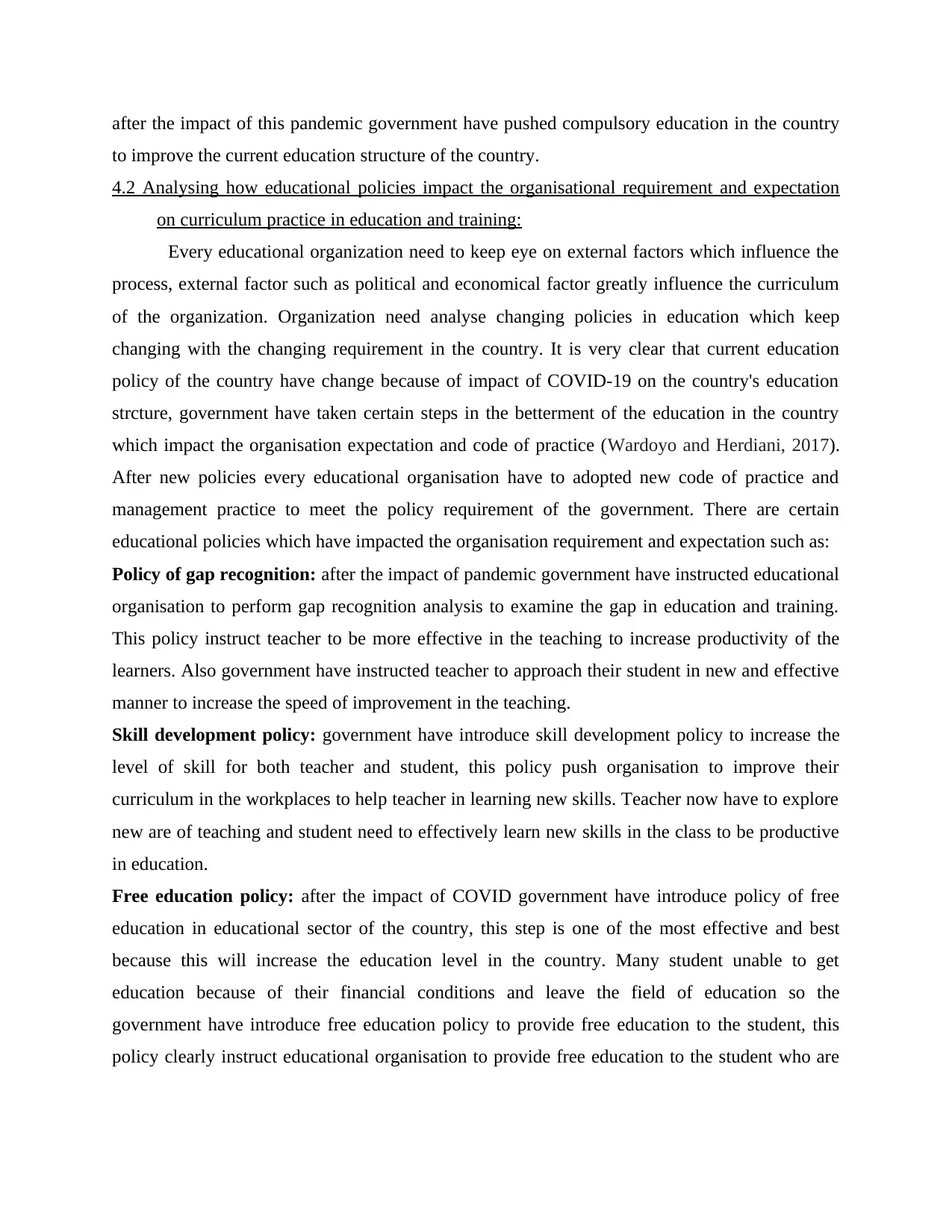
after the impact of this pandemic government have pushed compulsory education in the country
to improve the current education structure of the country.
4.2 Analysing how educational policies impact the organisational requirement and expectation
on curriculum practice in education and training:
Every educational organization need to keep eye on external factors which influence the
process, external factor such as political and economical factor greatly influence the curriculum
of the organization. Organization need analyse changing policies in education which keep
changing with the changing requirement in the country. It is very clear that current education
policy of the country have change because of impact of COVID-19 on the country's education
strcture, government have taken certain steps in the betterment of the education in the country
which impact the organisation expectation and code of practice (Wardoyo and Herdiani, 2017).
After new policies every educational organisation have to adopted new code of practice and
management practice to meet the policy requirement of the government. There are certain
educational policies which have impacted the organisation requirement and expectation such as:
Policy of gap recognition: after the impact of pandemic government have instructed educational
organisation to perform gap recognition analysis to examine the gap in education and training.
This policy instruct teacher to be more effective in the teaching to increase productivity of the
learners. Also government have instructed teacher to approach their student in new and effective
manner to increase the speed of improvement in the teaching.
Skill development policy: government have introduce skill development policy to increase the
level of skill for both teacher and student, this policy push organisation to improve their
curriculum in the workplaces to help teacher in learning new skills. Teacher now have to explore
new are of teaching and student need to effectively learn new skills in the class to be productive
in education.
Free education policy: after the impact of COVID government have introduce policy of free
education in educational sector of the country, this step is one of the most effective and best
because this will increase the education level in the country. Many student unable to get
education because of their financial conditions and leave the field of education so the
government have introduce free education policy to provide free education to the student, this
policy clearly instruct educational organisation to provide free education to the student who are
to improve the current education structure of the country.
4.2 Analysing how educational policies impact the organisational requirement and expectation
on curriculum practice in education and training:
Every educational organization need to keep eye on external factors which influence the
process, external factor such as political and economical factor greatly influence the curriculum
of the organization. Organization need analyse changing policies in education which keep
changing with the changing requirement in the country. It is very clear that current education
policy of the country have change because of impact of COVID-19 on the country's education
strcture, government have taken certain steps in the betterment of the education in the country
which impact the organisation expectation and code of practice (Wardoyo and Herdiani, 2017).
After new policies every educational organisation have to adopted new code of practice and
management practice to meet the policy requirement of the government. There are certain
educational policies which have impacted the organisation requirement and expectation such as:
Policy of gap recognition: after the impact of pandemic government have instructed educational
organisation to perform gap recognition analysis to examine the gap in education and training.
This policy instruct teacher to be more effective in the teaching to increase productivity of the
learners. Also government have instructed teacher to approach their student in new and effective
manner to increase the speed of improvement in the teaching.
Skill development policy: government have introduce skill development policy to increase the
level of skill for both teacher and student, this policy push organisation to improve their
curriculum in the workplaces to help teacher in learning new skills. Teacher now have to explore
new are of teaching and student need to effectively learn new skills in the class to be productive
in education.
Free education policy: after the impact of COVID government have introduce policy of free
education in educational sector of the country, this step is one of the most effective and best
because this will increase the education level in the country. Many student unable to get
education because of their financial conditions and leave the field of education so the
government have introduce free education policy to provide free education to the student, this
policy clearly instruct educational organisation to provide free education to the student who are
Paraphrase This Document
Need a fresh take? Get an instant paraphrase of this document with our AI Paraphraser
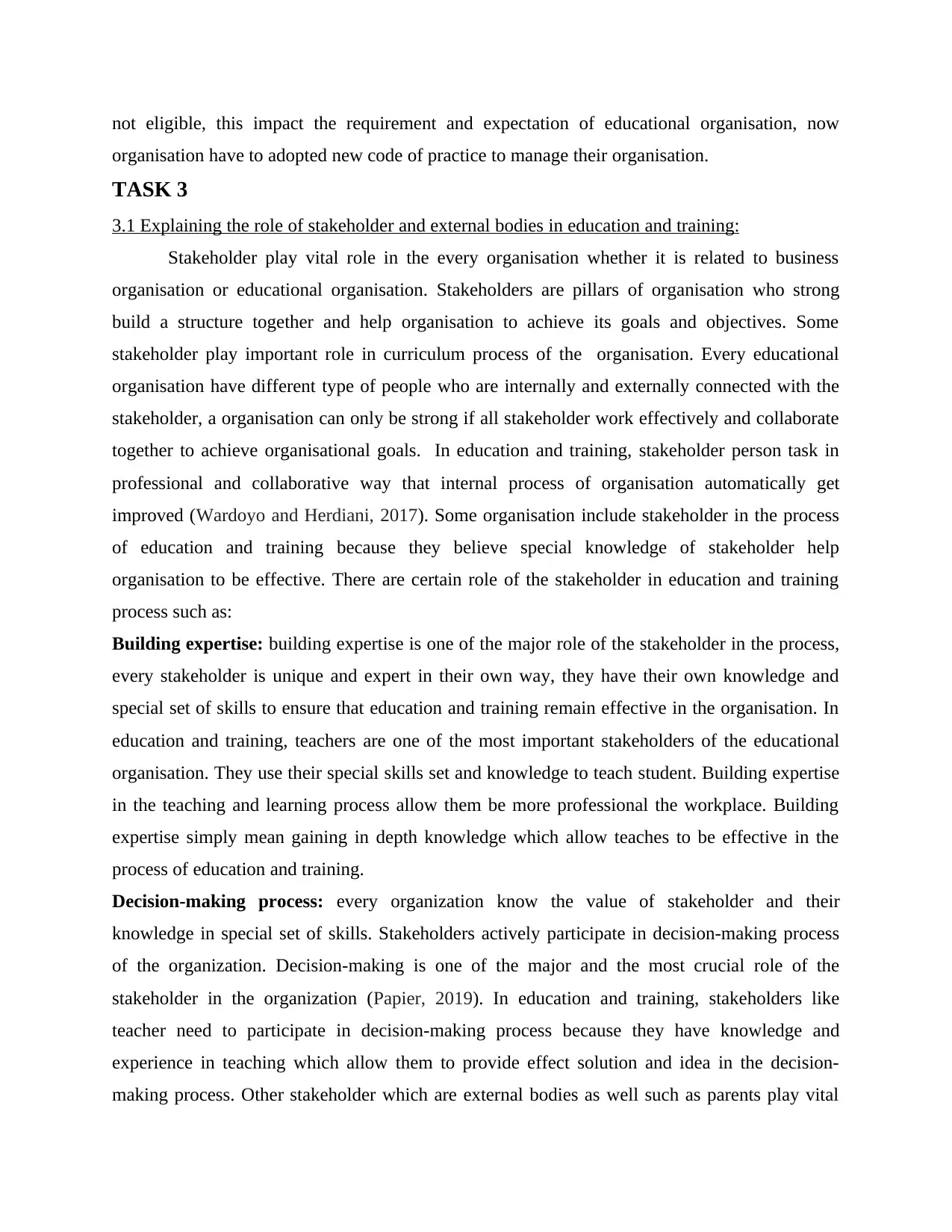
not eligible, this impact the requirement and expectation of educational organisation, now
organisation have to adopted new code of practice to manage their organisation.
TASK 3
3.1 Explaining the role of stakeholder and external bodies in education and training:
Stakeholder play vital role in the every organisation whether it is related to business
organisation or educational organisation. Stakeholders are pillars of organisation who strong
build a structure together and help organisation to achieve its goals and objectives. Some
stakeholder play important role in curriculum process of the organisation. Every educational
organisation have different type of people who are internally and externally connected with the
stakeholder, a organisation can only be strong if all stakeholder work effectively and collaborate
together to achieve organisational goals. In education and training, stakeholder person task in
professional and collaborative way that internal process of organisation automatically get
improved (Wardoyo and Herdiani, 2017). Some organisation include stakeholder in the process
of education and training because they believe special knowledge of stakeholder help
organisation to be effective. There are certain role of the stakeholder in education and training
process such as:
Building expertise: building expertise is one of the major role of the stakeholder in the process,
every stakeholder is unique and expert in their own way, they have their own knowledge and
special set of skills to ensure that education and training remain effective in the organisation. In
education and training, teachers are one of the most important stakeholders of the educational
organisation. They use their special skills set and knowledge to teach student. Building expertise
in the teaching and learning process allow them be more professional the workplace. Building
expertise simply mean gaining in depth knowledge which allow teaches to be effective in the
process of education and training.
Decision-making process: every organization know the value of stakeholder and their
knowledge in special set of skills. Stakeholders actively participate in decision-making process
of the organization. Decision-making is one of the major and the most crucial role of the
stakeholder in the organization (Papier, 2019). In education and training, stakeholders like
teacher need to participate in decision-making process because they have knowledge and
experience in teaching which allow them to provide effect solution and idea in the decision-
making process. Other stakeholder which are external bodies as well such as parents play vital
organisation have to adopted new code of practice to manage their organisation.
TASK 3
3.1 Explaining the role of stakeholder and external bodies in education and training:
Stakeholder play vital role in the every organisation whether it is related to business
organisation or educational organisation. Stakeholders are pillars of organisation who strong
build a structure together and help organisation to achieve its goals and objectives. Some
stakeholder play important role in curriculum process of the organisation. Every educational
organisation have different type of people who are internally and externally connected with the
stakeholder, a organisation can only be strong if all stakeholder work effectively and collaborate
together to achieve organisational goals. In education and training, stakeholder person task in
professional and collaborative way that internal process of organisation automatically get
improved (Wardoyo and Herdiani, 2017). Some organisation include stakeholder in the process
of education and training because they believe special knowledge of stakeholder help
organisation to be effective. There are certain role of the stakeholder in education and training
process such as:
Building expertise: building expertise is one of the major role of the stakeholder in the process,
every stakeholder is unique and expert in their own way, they have their own knowledge and
special set of skills to ensure that education and training remain effective in the organisation. In
education and training, teachers are one of the most important stakeholders of the educational
organisation. They use their special skills set and knowledge to teach student. Building expertise
in the teaching and learning process allow them be more professional the workplace. Building
expertise simply mean gaining in depth knowledge which allow teaches to be effective in the
process of education and training.
Decision-making process: every organization know the value of stakeholder and their
knowledge in special set of skills. Stakeholders actively participate in decision-making process
of the organization. Decision-making is one of the major and the most crucial role of the
stakeholder in the organization (Papier, 2019). In education and training, stakeholders like
teacher need to participate in decision-making process because they have knowledge and
experience in teaching which allow them to provide effect solution and idea in the decision-
making process. Other stakeholder which are external bodies as well such as parents play vital
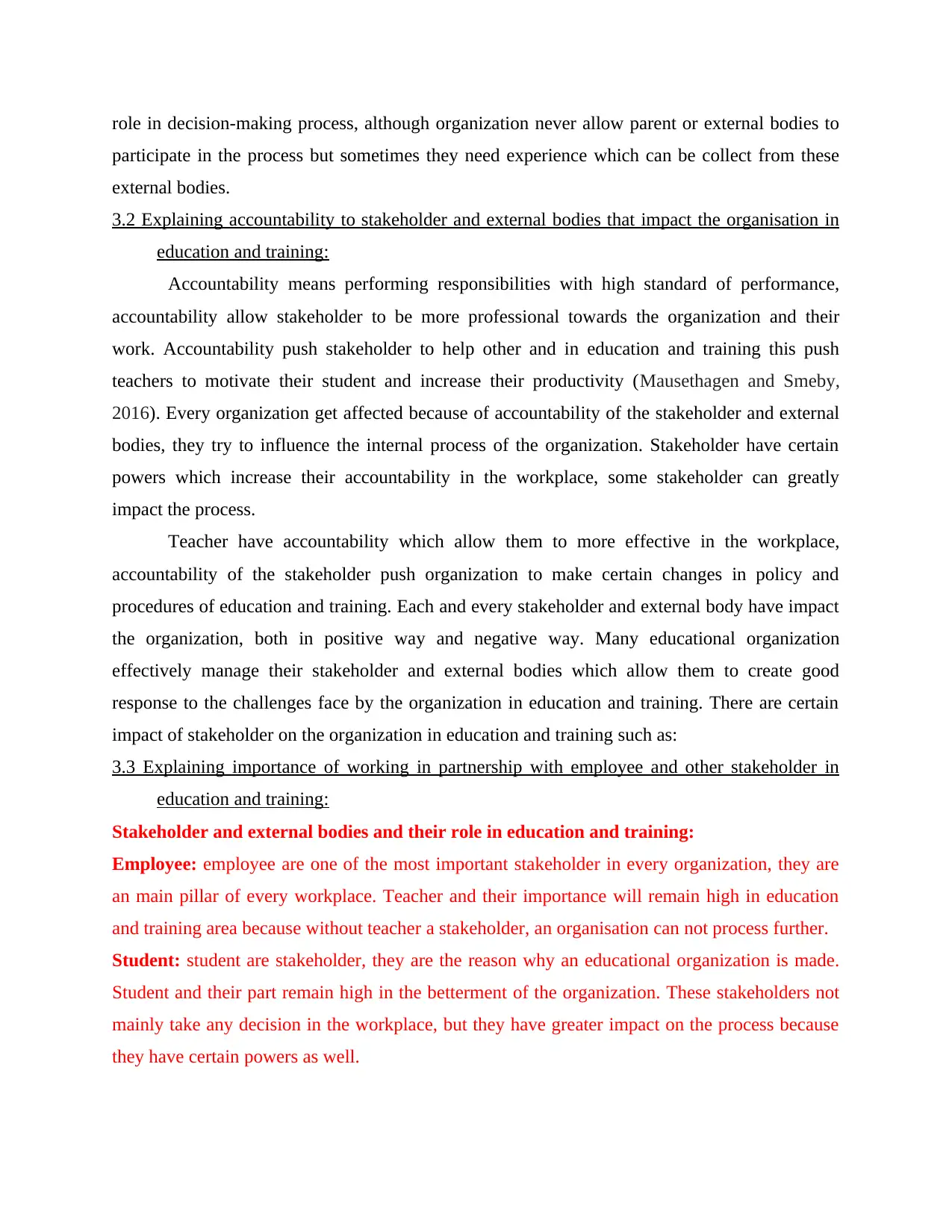
role in decision-making process, although organization never allow parent or external bodies to
participate in the process but sometimes they need experience which can be collect from these
external bodies.
3.2 Explaining accountability to stakeholder and external bodies that impact the organisation in
education and training:
Accountability means performing responsibilities with high standard of performance,
accountability allow stakeholder to be more professional towards the organization and their
work. Accountability push stakeholder to help other and in education and training this push
teachers to motivate their student and increase their productivity (Mausethagen and Smeby,
2016). Every organization get affected because of accountability of the stakeholder and external
bodies, they try to influence the internal process of the organization. Stakeholder have certain
powers which increase their accountability in the workplace, some stakeholder can greatly
impact the process.
Teacher have accountability which allow them to more effective in the workplace,
accountability of the stakeholder push organization to make certain changes in policy and
procedures of education and training. Each and every stakeholder and external body have impact
the organization, both in positive way and negative way. Many educational organization
effectively manage their stakeholder and external bodies which allow them to create good
response to the challenges face by the organization in education and training. There are certain
impact of stakeholder on the organization in education and training such as:
3.3 Explaining importance of working in partnership with employee and other stakeholder in
education and training:
Stakeholder and external bodies and their role in education and training:
Employee: employee are one of the most important stakeholder in every organization, they are
an main pillar of every workplace. Teacher and their importance will remain high in education
and training area because without teacher a stakeholder, an organisation can not process further.
Student: student are stakeholder, they are the reason why an educational organization is made.
Student and their part remain high in the betterment of the organization. These stakeholders not
mainly take any decision in the workplace, but they have greater impact on the process because
they have certain powers as well.
participate in the process but sometimes they need experience which can be collect from these
external bodies.
3.2 Explaining accountability to stakeholder and external bodies that impact the organisation in
education and training:
Accountability means performing responsibilities with high standard of performance,
accountability allow stakeholder to be more professional towards the organization and their
work. Accountability push stakeholder to help other and in education and training this push
teachers to motivate their student and increase their productivity (Mausethagen and Smeby,
2016). Every organization get affected because of accountability of the stakeholder and external
bodies, they try to influence the internal process of the organization. Stakeholder have certain
powers which increase their accountability in the workplace, some stakeholder can greatly
impact the process.
Teacher have accountability which allow them to more effective in the workplace,
accountability of the stakeholder push organization to make certain changes in policy and
procedures of education and training. Each and every stakeholder and external body have impact
the organization, both in positive way and negative way. Many educational organization
effectively manage their stakeholder and external bodies which allow them to create good
response to the challenges face by the organization in education and training. There are certain
impact of stakeholder on the organization in education and training such as:
3.3 Explaining importance of working in partnership with employee and other stakeholder in
education and training:
Stakeholder and external bodies and their role in education and training:
Employee: employee are one of the most important stakeholder in every organization, they are
an main pillar of every workplace. Teacher and their importance will remain high in education
and training area because without teacher a stakeholder, an organisation can not process further.
Student: student are stakeholder, they are the reason why an educational organization is made.
Student and their part remain high in the betterment of the organization. These stakeholders not
mainly take any decision in the workplace, but they have greater impact on the process because
they have certain powers as well.
⊘ This is a preview!⊘
Do you want full access?
Subscribe today to unlock all pages.

Trusted by 1+ million students worldwide
1 out of 20
Related Documents
Your All-in-One AI-Powered Toolkit for Academic Success.
+13062052269
info@desklib.com
Available 24*7 on WhatsApp / Email
![[object Object]](/_next/static/media/star-bottom.7253800d.svg)
Unlock your academic potential
Copyright © 2020–2026 A2Z Services. All Rights Reserved. Developed and managed by ZUCOL.
